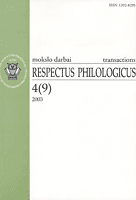Cultural Values and Negative Politeness in English and Russian
Cultural Values and Negative Politeness in English and Russian
Author(s): Tatiana LarinaSubject(s): Language and Literature Studies
Published by: Vilniaus Universiteto Leidykla
Keywords: intercultural communication; language and culture; cultural values; politeness; semantic option; pragmatic option; Command; Request; Invitation
Summary/Abstract: The phenomenon of politeness is universal and at the same time is culture specific. Traditionally it is defined as respect and consideration for other people. But in intercultural aspect this definition does not work as the concepts of politeness, respect and consideration are understood differently and even these words have different meaning. In this paper politeness is viewed as strategic behaviour, a system of culturally-specific and highly ritualized communicative strategies which functions are to maximize harmonious interaction and minimize the possibility of conflict. The present research is mainly based on Brown and Levinson’s politeness theory (1978,1987) which gives an effective mechanism for understanding interlocutors’ communicative behaviour, but the main emphasis is put on the principal strategic differences between English and Russian negative politeness and the attempt to explain them through social organization and cultural values. The paper gives empirical data on such Speech Acts as Command and Invitation. The comparative analysis was conducted on the basis of ethnographic observation, questionnaires and interviews.
Journal: Respectus Philologicus
- Issue Year: 2005
- Issue No: 08 (13)
- Page Range: 25-39
- Page Count: 15
- Language: English

